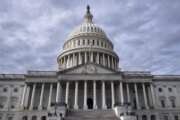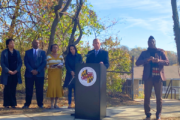SAVANNAH, Ga. (AP) — Attorneys for a Georgia inmate sent to death row 25 years ago are accusing a prosecutor of hiding a deal that they contend casts doubt on the credibility of a crucial trial witness.
Warren King was sentenced to death in September 1998 after an Appling County jury convicted him of murdering Karen Crosby, a convenience store clerk who was fatally shot during an armed robbery in southeast Georgia.
Now, King’s lawyers say they have evidence that the assistant district attorney who prosecuted the case, John B. Johnson, made a previously undisclosed deal with the only eyewitness to the crime. They’re asking a Superior Court judge in Butts County, home of Georgia’s death row, for a hearing in hopes of King getting a new trial.
Evidence at King’s murder trial showed that he and Walter Smith went together to rob the rural convenience store in September 1994, and that Smith brought his uncle’s gun and a mask. Both men were charged with Crosby’s murder, with King standing trial first.
Prosecutors granted Smith immunity to take the witness stand at King’s trial, and Smith told the jury it was King who shot the woman. King’s lawyers say no other witnesses or physical evidence pointed to King as the shooter.
What prosecutors didn’t disclose to defense attorneys or the trial jury is that Johnson had promised to spare Smith from a possible death sentence in exchange for his testimony, King’s lawyers said in a July 8 legal filing.
Prosecutors would have been required to disclose to defense lawyers any favorable treatment Smith received in exchange for testifying, King’s appellate lawyers said. Had King’s trial attorneys known about the deal, they could have used it to attack Smith’s credibility as a witness.
“Had this suppressed evidence been disclosed, there is a reasonable probability that the outcome of the trial would have been different,” attorney Anna Arceneaux wrote in King’s legal filing.
Arceneaux wrote that not only did prosecutors withhold knowledge of the deal from defense attorneys before the 1998 trial, but Johnson and Smith both denied its existence in remarks to the jury.
The Associated Press left a telephone message seeking comment with Johnson on Wednesday. The veteran prosecutor retired from the district attorney’s office for the Brunswick Judicial Circuit in 2021. He unsuccessfully challenged District Attorney Keith Higgins in a Republican primary election in May.
The new legal documents include an affidavit from one of Smith’s attorneys, John B. Brewer III, saying that Johnson and Smith reached a plea agreement before the trial. The terms were that Smith would receive a life sentence with a chance for parole in exchange for him testifying against King. Smith received that punishment in 2001 when he pleaded guilty to a charge of murder in Crosby’s death.
“These terms were not reduced to writing, but there was a verbal agreement,” Brewer’s affidavit said. He added: “I would never have recommended that Mr. Smith testify against Mr. King unless I knew for certain that he had a deal and would avoid the death penalty.”
According to a transcript of his closing arguments during the 1998 trial, Johnson told the jury that he would have been required to disclose any deals with Smith “because it tests his credibility.”
“There are no deals or he would have told you that,” Johnson told the trial jury. “And defense counsel would have made sure you heard that if there was one.”
King’s latest attempt to overturn his death sentence comes after the U.S. Supreme Court on July 2 declined to consider his claims that Johnson improperly excluded Black jurors during the trial. King is Black; his trial was heard by 10 white and two Black jurors.
Lower courts upheld King’s conviction and sentence after his lawyers presented evidence that Johnson used strikes to eliminate 87.5% of the eligible Black jurors for the trial and only 8.8% of the eligible white jurors, all women.
A 1986 U.S. Supreme Court decision prohibits attorneys from excluding prospective jurors based on their race. At the trial, Johnson gave other, nonracial reasons for keeping Black panelists off the jury.
In their July 8 legal filing, King’s attorneys repeat their assertion that potential Black jurors were struck because of their race. They cite new evidence: Johnson’s own handwritten notes, which they obtained last fall. The lawyers say the notes show Johnson carefully tracked which prospective jurors were Black and which were women.
King’s attorneys said Johnson took notes on how potential Black jurors answered questions about the death penalty and whether they had criminal histories. They say he didn’t make similar notes for white panelists, but rather tracked which potential white jurors had family members who were crime victims.
King’s lawyers said the prosecutor’s notes provide “concrete proof that Johnson was indeed considering race and gender” of prospective jurors.
Copyright © 2024 The Associated Press. All rights reserved. This material may not be published, broadcast, written or redistributed.







